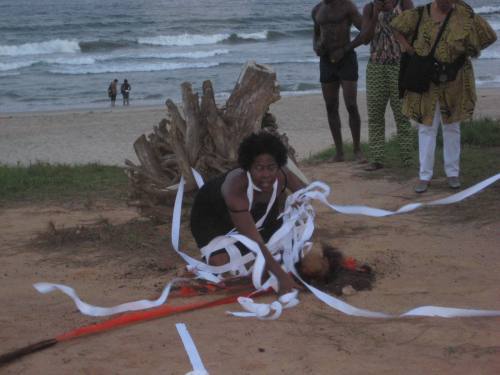Zetta Elliott's Blog, page 65
June 23, 2013
Book Party for Girls Write Now!
 After guiding each mentee through so many of the rites of the writer’s life — creation, revision, submission, public presentation — the Girls Write Now Mentoring Program culminates with an annual anthology, in which each student and mentor showcases their best original work. Structured around this year’s overarching curricular theme, New Worlds, the 2013 anthology is composed of stories that celebrate the incredible diversity and creative fearlessness of our intergenerational community, showcasing poetry, fiction, memoir and more that surprise us and stretch our understanding of the world and ourselves.
After guiding each mentee through so many of the rites of the writer’s life — creation, revision, submission, public presentation — the Girls Write Now Mentoring Program culminates with an annual anthology, in which each student and mentor showcases their best original work. Structured around this year’s overarching curricular theme, New Worlds, the 2013 anthology is composed of stories that celebrate the incredible diversity and creative fearlessness of our intergenerational community, showcasing poetry, fiction, memoir and more that surprise us and stretch our understanding of the world and ourselves.
The Girls Write Now anthology has been recognized as Outstanding Book of the Year in the Independent Publisher Book Awards, and has earned additional honors from the International Book Awards, the National Indie Excellence Awards, the Next Generation Indie Book Awards, and the New York Book Festival.
This event is open to the public so stop by and support these amazing young women!


June 19, 2013
Juneteenth
 Being the descendant of slaves gives you a clear sense of perspective. I already know that my anxiety sometimes leads me to have a disproportionate reaction to certain things, but I wasn’t overreacting yesterday when my new tablet shut off unexpectedly and I lost FOUR days of writing. That’s almost 4000 words! I managed to write 400 words last night (I’m trying to write 1K words/day) and then got up this morning hoping the tech people at work would be able to recover my lost document (they couldn’t). First I stopped at the African Burial Ground National Monument in order to participate in their Juneteenth events. I helped to read aloud the names of 1300 abolitionists and then went back outside to see some Civil War reenactors
Being the descendant of slaves gives you a clear sense of perspective. I already know that my anxiety sometimes leads me to have a disproportionate reaction to certain things, but I wasn’t overreacting yesterday when my new tablet shut off unexpectedly and I lost FOUR days of writing. That’s almost 4000 words! I managed to write 400 words last night (I’m trying to write 1K words/day) and then got up this morning hoping the tech people at work would be able to recover my lost document (they couldn’t). First I stopped at the African Burial Ground National Monument in order to participate in their Juneteenth events. I helped to read aloud the names of 1300 abolitionists and then went back outside to see some Civil War reenactors 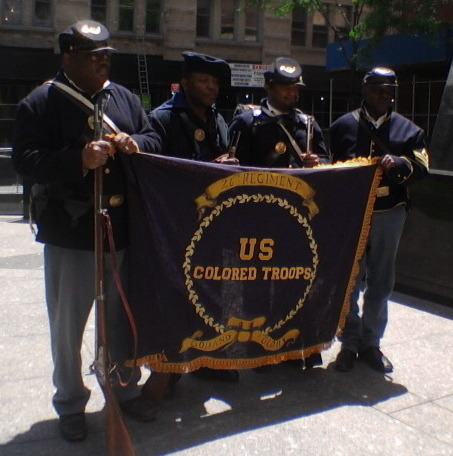 representing the 26th United States Colored Troops. Judah encounters Union soldiers in this novel and so it was good to see an example of the uniforms, weapons, tent, and other supplies (including food) that African American soldiers would have used. By the time I got to work, I no longer had much hope that the lost document would be recovered. And you know what? It’s ok. I was on the verge of tears yesterday but today I know that in the grand scheme of things, losing a couple chapters of my novel isn’t a real hardship. Imagine those poor folks in Texas who should have been freed in 1863 but were kept in bondage for another two and a half years. They didn’t fuss and complain—they moved forward (and set up an annual party to remind them of their blessings). People suffered so much for me to be where I am today, to have the kind of life where I can dream about the past and write books that give voice to some of those who were unfairly silenced. So I will simply start over and visit the Mac store tomorrow to get the replacement laptop I should have bought a month ago…
representing the 26th United States Colored Troops. Judah encounters Union soldiers in this novel and so it was good to see an example of the uniforms, weapons, tent, and other supplies (including food) that African American soldiers would have used. By the time I got to work, I no longer had much hope that the lost document would be recovered. And you know what? It’s ok. I was on the verge of tears yesterday but today I know that in the grand scheme of things, losing a couple chapters of my novel isn’t a real hardship. Imagine those poor folks in Texas who should have been freed in 1863 but were kept in bondage for another two and a half years. They didn’t fuss and complain—they moved forward (and set up an annual party to remind them of their blessings). People suffered so much for me to be where I am today, to have the kind of life where I can dream about the past and write books that give voice to some of those who were unfairly silenced. So I will simply start over and visit the Mac store tomorrow to get the replacement laptop I should have bought a month ago…


June 16, 2013
After Earth: making space for blackness
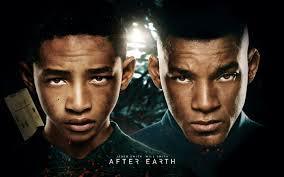 On Friday I learned that the editor who agreed to acquire The Deep has since left the imprint. Another editor is willing to take a look at the manuscript, but the acquisitions board has decided to pass on my book. On Saturday I went to see After Earth (spoilers ahead); the reviews haven’t been good, but I’ve been wanting to see this film ever since the previews started last year. I’m not a huge fan of Will Smith (he’s talented but overexposed, in my opinion) and I didn’t enjoy his last collaboration with son Jaden, but After Earth intrigued me. I didn’t know M. Night Shyamalan was the director, nor did I realize that Will Smith came up with the story himself. I knew it took place long after humans had abandoned Earth but I didn’t know there was an alien menace…basically I decided to see the film because I’ve never seen a black family in space on film. Yes, there’s Uhura from Star Trek but I was never a Trekkie and I didn’t care for the recent film prequel—now that I think about it, I’m not sure I can even name any black women who got to be in space in something
On Friday I learned that the editor who agreed to acquire The Deep has since left the imprint. Another editor is willing to take a look at the manuscript, but the acquisitions board has decided to pass on my book. On Saturday I went to see After Earth (spoilers ahead); the reviews haven’t been good, but I’ve been wanting to see this film ever since the previews started last year. I’m not a huge fan of Will Smith (he’s talented but overexposed, in my opinion) and I didn’t enjoy his last collaboration with son Jaden, but After Earth intrigued me. I didn’t know M. Night Shyamalan was the director, nor did I realize that Will Smith came up with the story himself. I knew it took place long after humans had abandoned Earth but I didn’t know there was an alien menace…basically I decided to see the film because I’ve never seen a black family in space on film. Yes, there’s Uhura from Star Trek but I was never a Trekkie and I didn’t care for the recent film prequel—now that I think about it, I’m not sure I can even name any black women who got to be in space in something 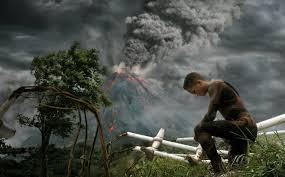 other than a miniskirt. Can you? The women in After Earth (Sophie Okonedo and Zoe Kravitz) were mostly treated like eye candy, which was annoying, and the film was a bit slow and poorly written. But it was fairly original—at least it felt “new” to me because I haven’t seen a teenage black boy in a space suit fighting aliens. As Kitai, son of a gifted and revered military commander who’s injured in a crash, Jaden Smith gets to be on screen alone and much of the time he’s frightened, making mistakes, and desperate for the help his father can’t provide. We even see him cry, which is important since black boys aren’t often seen as vulnerable in our society. All boys face penalties for showing weakness, and so I liked that Kitai wasn’t stoic like his father and in the end rejects a military life despite learning he is actually stronger than he thought.
other than a miniskirt. Can you? The women in After Earth (Sophie Okonedo and Zoe Kravitz) were mostly treated like eye candy, which was annoying, and the film was a bit slow and poorly written. But it was fairly original—at least it felt “new” to me because I haven’t seen a teenage black boy in a space suit fighting aliens. As Kitai, son of a gifted and revered military commander who’s injured in a crash, Jaden Smith gets to be on screen alone and much of the time he’s frightened, making mistakes, and desperate for the help his father can’t provide. We even see him cry, which is important since black boys aren’t often seen as vulnerable in our society. All boys face penalties for showing weakness, and so I liked that Kitai wasn’t stoic like his father and in the end rejects a military life despite learning he is actually stronger than he thought.
As I watched the film, I thought about my books and the kind of intervention I’m trying to make in the field of sci-fi/fantasy. My writing is rooted, in part, in an understanding of the history of misrepresentation of black people, yet when white editors/readers/reviewers engage with my work, they don’t always “get it.” And that’s ok, in a way, because I’m not writing for them. I wonder how the Smith family feels about After Earth and the reviews it has received so far. I understand why Will & Jada Pinkett-Smith founded their own production company, and while I don’t like silver platters, I appreciate their decision to develop projects for their kids to star in. If they waited on Hollywood, Jaden and Willow would be nothing more than sidekicks to white actors who may or may not have as much talent. I hope kids of color go see this film; it’s solid family fare, and who knows how long we’ll have to wait for another film that lets a slender black boy be the hero…
PS Jada, please do for black girls what Will’s doing for black boys.


June 8, 2013
Hummingbirds: Magic in the Air
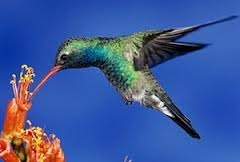 I watched this Nature documentary for the third time on Wednesday. I plan to use the hummingbird as a metaphor for myself and my search for the truth about my grandmother, so this time I took notes. I also did a three-day training last week in order to make my courses writing intensive; we were encouraged to develop a theme for each class and I’ve decided that my course on black masculinity will now focus on the evolution of black male identity. Sometimes I think I may have missed my calling as a scientist. I used to make “potions” when I was a kid, recklessly blending whatever products I could find under the bathroom sink. I think science stopped being fun in high school—suddenly we were dissecting baby pigs and having to memorize the periodic table. I stuck with environmental science but everything else fell by the wayside. The Hummingbird’s Tongue is an experimental memoir and I plan to include some scientific data about these fascinating birds. Here are some facts about hummingbirds that will amaze you:
I watched this Nature documentary for the third time on Wednesday. I plan to use the hummingbird as a metaphor for myself and my search for the truth about my grandmother, so this time I took notes. I also did a three-day training last week in order to make my courses writing intensive; we were encouraged to develop a theme for each class and I’ve decided that my course on black masculinity will now focus on the evolution of black male identity. Sometimes I think I may have missed my calling as a scientist. I used to make “potions” when I was a kid, recklessly blending whatever products I could find under the bathroom sink. I think science stopped being fun in high school—suddenly we were dissecting baby pigs and having to memorize the periodic table. I stuck with environmental science but everything else fell by the wayside. The Hummingbird’s Tongue is an experimental memoir and I plan to include some scientific data about these fascinating birds. Here are some facts about hummingbirds that will amaze you:
they are the smallest of all warm-blooded creatures
they can hover like insects, which enables them to fly backwards
8000 plant species rely upon hummingbirds for pollination
they can live at high altitudes (12000ft) where no other birds can survive
the species we see in the northeast migrate from Panama and Costa Rica, a round trip journey of 6000 miles
hummingbirds cross the Gulf of Mexico—500 miles of water—in 18 hours
insects comprise one quarter of a hummingbird’s diet
they eat half their body weight in nectar every day, which means they feed at 1000 flowers between dawn and dusk
they have a heart rate of 600bpm when they’re at rest; it’s double that when they’re flying
their wings beats 200x/second
at night they go into a state of torpor, lowering their heart rate to 36bpm which cuts their body temperature in half
there are 350 species of hummingbird and most are endangered


June 4, 2013
WORD: A Caribbean Book Fest
BOOK BUSINESS
2:00PM
Balancing Creativity and Commerce in Caribbean Literary Expression
Marva Allen - CEO of Hue-man Bookstore, and co-publisher of Open Lens an imprint of Akashic Books
Crystal Bobb-Semple – owner of Brownstone Bookstore
Ron Kavanaugh – founder and managing editor of Mosaic Literary Magazine, exploring the literary arts created by writers of African descent
Summer Edward – founder and managing editor of Anansesem, Caribbean children’s literature ezine
Victoria Brown, author, Grace in the City – Moderator

YOUNG READERS
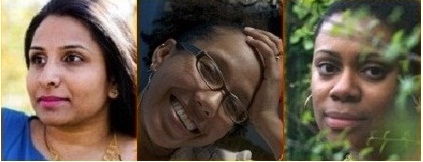 3:15PM
3:15PMCulture Making – Literature that Defines Us (Under 8 yrs)
Shabana Sharif (US/Guyana), “Ins and Out of Queens”
Tiphanie Yanique (Virgin Is), “I am the Virgin Islands”
Ibi Zoboi (Haiti), “A is for Ayiti”

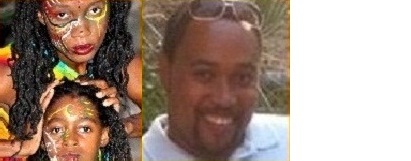 4:30PM
4:30PMMemory and Myth – Rooted in history and the fantastical
(8 – 15 yrs)
Tracey & Harmony Pierre (US/Haiti)
Clyde Viechweg (Grenada), “CaribbeanTwilight; Tales of the Supernatural”

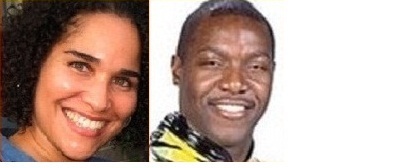 5:40PM
5:40PMOff Island – Journeys in time and place
(Teens – Young Adults)
Zetta Elliott (St. Kitts-Nevis), “Ship of Souls”
Devon Harris (Jamaica), “Yes I Can”
Workshops & Special Presentations
Illustration, Graphic & Costume Design, Steel Pan Demonstration; Storytelling

ADULT BOOK WRITERS
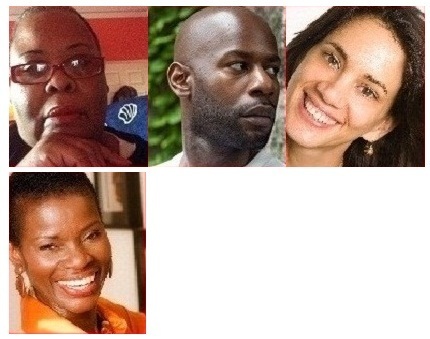 3:15PM
3:15PMWhere We’re From – Identity and Influence
Carmen Bardeguez-Brown (Puerto Rico), “Straight from the Drum”
Etaniel Ben Yehuda (US/Trinidad & Tobago), “The Chronicles of Air, Water, and the Source”
Anna Ruth Henriques (Jamaica), “The Book of Mechtilde”
Monica Matthew (Antigua & Barbuda), “Journeycakes: Memories with my Antiguan Mama”

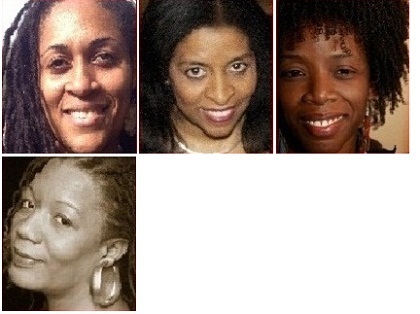 4:30PM
4:30PMMemory and Myth – Our History Clings to Us
Keisha Gay Anderson (Jamaica)
Lynn Grange (Trinidad & Tobago),
“Freedom and the Cashew Seed”
Petra Lewis (Trinidad & Tobago), “Sons and Daughters of Ham”
Bernice McFadden (US/Barbados),
“Nowhere is a Place”

 5:40PM
5:40PMOff Island – Migration and Displacement
Elsie Agustave (Haiti), “The Roving Tree”
Elizabeth Nunez (Trinidad & Tobago), “Boundaries”
Sandra Ottey (Jamaica), “Runaway Comeback”

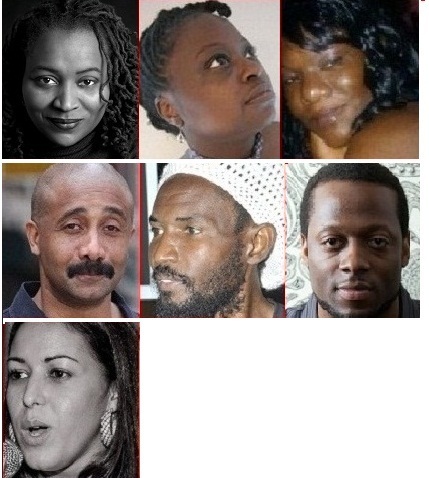 7:00PM
7:00PM
Get Up Stand Up – Texts of Empowerment
Deborah Jack (St Martin/St Maarten)
Rosamond King (US/Gambia/Trinidad), “At My Belly and My Back”
Hermina Marcellin (St. Lucia)
David Mills (US/Jamaica), “The Sudden Country”
Ras Osagyefo (Jamaica), “Psalms of Osagyefo”
Jive Poetic (US/Jamaica)
Maria Rodriguez (US/Puerto Rico)
Program, schedule and writers subject to change without notice.



BECOME A FRIEND





























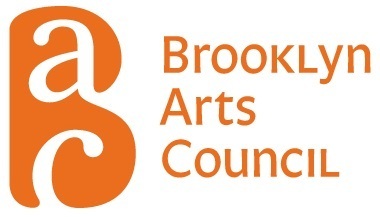
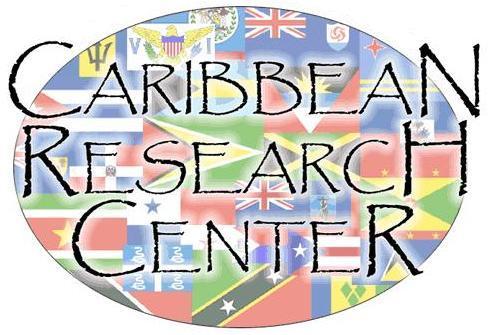

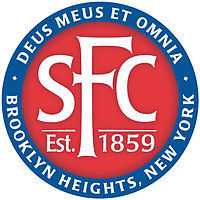
Brooklyn Caribbean Youth Fest
Caribbean American Sports & Cultural Youth Movement (CASYM)
Friends of the Antigua Public Library
Mosaic Literary Magazine
NAACP/ACT-SO
St. Martin/St. Maarten Friendship Association
Tropical Fete Mas Camp
Union of Jamaica Alumni Associations (UJAA)


June 2, 2013
underground
 I never had a chance to capture the amazing anthills we saw in Ghana, but this internet image comes close. From inside the tour bus I marveled at their height—some certainly exceeded six feet—and the intricate design made from millions of grains of Ghana’s distinctive red soil. I also wondered about the unseen world within and beneath those striking mountains that dotted the countryside. Today I’m trying to write and so I’m looking inward, reflecting on the forces that built the identity I currently inhabit. It’s complex! And always “in process,” though at 40 I can say that some aspects of my identity seem fixed. I booked my flight to Nevis last night and so pulled up The Hummingbird’s Tongue today. I don’t have much so far, just fragments of memories and the opening lines of what I hope will become paragraphs or even chapters. Here’s one example: “I have never trusted the sea.” And just now I made two lists: “How I know I’m not truly Caribbean” and “How I know I may indeed be Caribbean.” I’m being facetious, of course, but issues of authenticity are ridiculous and real. As we continue to think about the future of OWWA, one thing I feel strongly about is the addition of a “D” to represent either “diaspora” or “descent,” because I don’t identity as a woman writer of Africa. I appreciate the symbolic significance of choosing “Africa” instead of “black” a few decades ago, but in this historical moment I think we need to acknowledge the difference between African women and women of African descent. When I was in Nevis last July, my host always introduced me as a writer of Nevisian descent, and that was perfectly fine with me. I am a citizen now, but that doesn’t make me Nevisian. And when I was asked to read in a Caribbean literary festival, I hesitated—mostly because I know others will question my right to participate. A colleague recently sent me a contest for Caribbean writers, urging me to submit but the rules were very clear: they want writers based in the region and published by a Caribbean press. Which means that a white woman from the UK who has lived in Barbados for fifteen years could become the recipient of that prize, and black writers born in the Caribbean but publishing in the US could be deemed ineligible. And I think I’m ok with that. What troubles me is when the focus shifts to the content of the books, as in “A Caribbean writer must write about the Caribbean.” For this one-day festival I’m on a panel called “Off Island,” which is appropriate since I haven’t yet written a story set in the Caribbean. It’s slippery, though, and it does feel as though content is ranked, with stories set in the Caribbean at the top, followed by stories about Caribbean people living elsewhere, followed by stories that don’t deal with the Caribbean at all. If a black girl wants to write poems about a unicorn, she has that right—and she’s still a black poet. That’s something I talk about with my students when we cover the Black Arts Movement. Do black artists have to make protest art? Or is anything made by a black-identified artist “black art?” I didn’t expect to grapple with my identity as a Caribbean writer until I published The Hummingbird’s Tongue, but the book is partly about my identity so let the grappling begin…
I never had a chance to capture the amazing anthills we saw in Ghana, but this internet image comes close. From inside the tour bus I marveled at their height—some certainly exceeded six feet—and the intricate design made from millions of grains of Ghana’s distinctive red soil. I also wondered about the unseen world within and beneath those striking mountains that dotted the countryside. Today I’m trying to write and so I’m looking inward, reflecting on the forces that built the identity I currently inhabit. It’s complex! And always “in process,” though at 40 I can say that some aspects of my identity seem fixed. I booked my flight to Nevis last night and so pulled up The Hummingbird’s Tongue today. I don’t have much so far, just fragments of memories and the opening lines of what I hope will become paragraphs or even chapters. Here’s one example: “I have never trusted the sea.” And just now I made two lists: “How I know I’m not truly Caribbean” and “How I know I may indeed be Caribbean.” I’m being facetious, of course, but issues of authenticity are ridiculous and real. As we continue to think about the future of OWWA, one thing I feel strongly about is the addition of a “D” to represent either “diaspora” or “descent,” because I don’t identity as a woman writer of Africa. I appreciate the symbolic significance of choosing “Africa” instead of “black” a few decades ago, but in this historical moment I think we need to acknowledge the difference between African women and women of African descent. When I was in Nevis last July, my host always introduced me as a writer of Nevisian descent, and that was perfectly fine with me. I am a citizen now, but that doesn’t make me Nevisian. And when I was asked to read in a Caribbean literary festival, I hesitated—mostly because I know others will question my right to participate. A colleague recently sent me a contest for Caribbean writers, urging me to submit but the rules were very clear: they want writers based in the region and published by a Caribbean press. Which means that a white woman from the UK who has lived in Barbados for fifteen years could become the recipient of that prize, and black writers born in the Caribbean but publishing in the US could be deemed ineligible. And I think I’m ok with that. What troubles me is when the focus shifts to the content of the books, as in “A Caribbean writer must write about the Caribbean.” For this one-day festival I’m on a panel called “Off Island,” which is appropriate since I haven’t yet written a story set in the Caribbean. It’s slippery, though, and it does feel as though content is ranked, with stories set in the Caribbean at the top, followed by stories about Caribbean people living elsewhere, followed by stories that don’t deal with the Caribbean at all. If a black girl wants to write poems about a unicorn, she has that right—and she’s still a black poet. That’s something I talk about with my students when we cover the Black Arts Movement. Do black artists have to make protest art? Or is anything made by a black-identified artist “black art?” I didn’t expect to grapple with my identity as a Caribbean writer until I published The Hummingbird’s Tongue, but the book is partly about my identity so let the grappling begin…


May 30, 2013
The 16 Percent: Social Norms, Bullying, and Neurodiversity
As promised, author Lyn Miller-Lachmann is back with a guest post on bullying—an issue addressed in her latest novel ROGUE. Take it away, Lyn!
Earlier this month I attended an anti-bullying workshop in Albany presented by the Anti-Defamation League, the organization known for its “A World of Difference” diversity training. Combatting bullying in K-12 schools is a new initiative for the ADL, one prompted by the rise of cyberbullying and the rash of suicides of young people targeted by bullies. Even though I got into the workshop because I teach part-time in a religious school program, I was more interested in this workshop because I experienced relentless bullying as a child and teenager, and both my recently-published novel, Rogue, and the one I wrote after Rogue begin with a bullying incident.
My difference as someone on the autism spectrum made me the target of bullies. Although I wasn’t officially diagnosed until adulthood, my atypical behavior—which included crying at the slightest provocation and having full-blown meltdowns when situations escalated—gave bored classmates endless opportunities for entertainment. In between provocations, however, I mainly experienced neglect and exclusion. I received few invitations to parties and was rarely chosen for teams or for leadership positions in school activities. Once, when I did become a committee chair in my temple youth group, an officer removed me several months later to give the position to one of her friends.
Although I encountered physical and emotional bullying, my protagonist in Rogue, Kiara, mainly experiences exclusion—first from the popular girls who push her lunch tray from the table, and then from the school that suspends her because she fights back. For much of the story, she sees herself on the outside, with her nose pressed to the glass of a world she cannot enter. While much of modern-day bullying occurs on the Internet, Kiara is so disconnected from her peers that she remains unaware of what they might be saying about her, at the same time as she trolls websites anonymously for advice on how to make and keep friends and information about a world she doesn’t understand.
girls who push her lunch tray from the table, and then from the school that suspends her because she fights back. For much of the story, she sees herself on the outside, with her nose pressed to the glass of a world she cannot enter. While much of modern-day bullying occurs on the Internet, Kiara is so disconnected from her peers that she remains unaware of what they might be saying about her, at the same time as she trolls websites anonymously for advice on how to make and keep friends and information about a world she doesn’t understand.
At the ADL workshop, the presenters introduced us to the social norms approach as a way of reducing the incidence of bullying in schools. This approach was first developed in the late 1980s as a way of reducing binge drinking in colleges and universities. The idea is to counteract the belief that “everyone does it” with actual statistics showing a small minority of students engaging in this dangerous practice. Once students see that binge drinking is an infrequent and extreme activity, peer pressure to drink will turn into peer pressure not to drink.
Adapted to counteract bullying in K-12 schools, the social norms approach leads to informational posters that read, “DID YOU KNOW, 96% of us think we should always try to be friendly with students who are different from us,” “Get the News! In the 30 days before the survey, most of us have not teased others in a mean way,” and “GREAT MINDS THINK ALIKE! A majority of Middle School students would tell an adult at school if they were being bullied.”
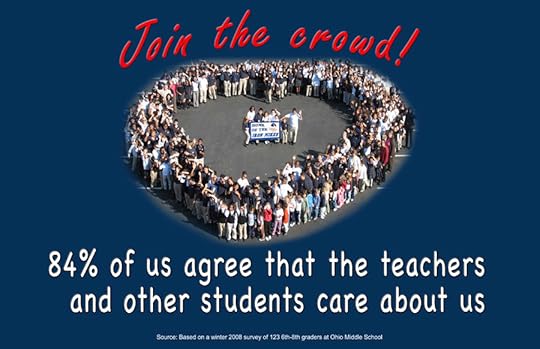 And then there was this one: “Join the crowd! 84% of us agree that the teachers and other students care about us.”
And then there was this one: “Join the crowd! 84% of us agree that the teachers and other students care about us.”
I raised my hand, and when the ADL presenter called on me, I said, “But what if you’re in the other 16%? That is an extremely isolating place to be.” I spoke about my own experience with exclusion because of my weak social skills and atypical behavior, and added, “And what if the 16% happens to be all the students who have disabilities? Or all the students with limited English proficiency? Or all the students who happen to live in a mobile home park in an otherwise wealthy suburb?”
One of the other people in the workshop answered, “If you see the poster about binge drinking, and you’re one of the 20% who binge drinks, that’s a sign that you need to get help. It’s the same in this case.”
But it’s not the same. To begin with, the individual takes action to drink while being an outcast is something others do to the individual. And while using social norms to rein in problem drinking has proven effective, social norms are part of the problem in dealing with individuals and groups who have already been put out of the pack.
My different perspective on the subject of social norms comes from personal experience—the kind of personal experience that went into the writing of Rogue. This different perspective is important if we want to eliminate bullying in schools and in society. A social norms approach is not the answer, unless we also include an understanding of and appreciation for diversity—including neurodiversity (http://en.wikipedia.org/wiki/Neurodiversity )—and a commitment to giving everyone a place of dignity, respect, and importance. And that means a genuine commitment, not giving an answer that the person doing the survey wants to hear but reaching out to people who may be isolated and difficult to reach. For that person who is different may be the one with the special talent to offer, or the solution to the problem.


May 29, 2013
going ROGUE with Lyn Miller-Lachmann
 Middle grade fiction is hot right now and a bold new novel came out this spring—ROGUE by Lyn Miller-Lachmann. Lyn and I go way back so I asked her to stop by and share some author insights about her latest book for young readers.
Middle grade fiction is hot right now and a bold new novel came out this spring—ROGUE by Lyn Miller-Lachmann. Lyn and I go way back so I asked her to stop by and share some author insights about her latest book for young readers.
1. I recently had a teacher object to the mention of addiction in my author talk—even though she read BIRD with her students. I was struck by how daring ROGUE is; a meth lab is central to the story, and there’s also teen drinking in this middle grade novel with an undiagnosed autistic protagonist. Can you talk about your approach to writing for contemporary adolescents–how do you gauge just what is and is not “age-appropriate?”
I originally wrote the novel as a YA, but my editor, Nancy Paulsen, suggested I revise it for an older middle grade readership. The revisions were substantial, going much further than cleaning up the language and sexual references. I had to learn what is considered “age-appropriate” for middle school readers—an even more difficult challenge because, as someone on the autism spectrum myself, I have trouble understanding social rules and conventions. In fact, my YA novel Gringolandia broke a lot of the rules of the genre in its honest depiction of the effects of dictatorship and torture, and I received a lot of critical praise for my willingness to trust teens’ ability to appreciate hard truths.
In fact, the middle grade genre is full of outstanding books that take on tough subjects. My editor is also the editor of Jacqueline Woodson’s award winning After Tupac and D Foster, which takes on some of the same issues along with foster care and homosexuality, and more recently, Lynda Mullaly Hunt’s powerful debut novel One for the Murphys, the story of a foster child that also deals with child abuse, alcoholism, and bullying. Alcoholic parents regularly appear in fiction for this age group. In Rogue, Chad, the boy that Kiara wants to be her friend, is heading toward alcoholism, which might make the story a bit edgier because it’s a peer and not an adult. On the other hand, Kiara does not drink, and Chad is widely seen as a “bad” boy. It takes someone like Kiara—herself an outcast from society—to see the good in Chad and to work toward finding a place in the world for him as she also struggles to find such a place for herself.
2. Speaking of age-appropriateness, I was struck by the fact that Kiara is thirteen or fourteen, but she tends to act much younger. How does that affect the age level of the novel’s potential readership?
The rule of thumb is determining the age of potential readers is “one year younger than the protagonist.” However, autism is a developmental disability that affects the person’s social interactions and ability to communicate with others. So Kiara may be a young teenager, but she often acts like a child. Children and adolescents on the autism spectrum often feel more comfortable interacting with adults, as Kiara does with her neighbor, Mrs. Mac, or with much younger children. Even though Kiara at first only plays with six-year-old Brandon because she wants his twelve-year-old brother to be her friend, her relationship with Brandon turns out to be closer and less rocky than with Chad, who’s almost a peer.
Because Kiara doesn’t fit easily into age categories, the novel may well appeal to a wider age range, particularly for young people with special needs. When ROGUE was a work-in-progress, I read the first chapter and spoke about the novel at an alternative high school for boys who had been expelled or excluded from their neighborhood schools. Even though the boys ranged in age from fourteen to seventeen, they could all relate to Kiara and what she does.
3. I thought a lot about gender as I read ROGUE. Desperate for friends, Kiara finds a way to belong by filming boys who do BMX and skateboarding stunts. At times I worried that she was taking on a passive role yet at the same time I was happy to see a girl occupying space normally reserved for boys. Why did you decide to immerse your female protagonist in a very male world?
To the best of my knowledge, Rogue is the only novel for young readers with a protagonist on the autism spectrum, written by someone on the autism spectrum. As a child and teen growing up on the spectrum—but not diagnosed until adulthood—I tended to hang out with boys rather than girls. The girls consistently excluded me, while some of the boys tolerated my hanging around because I knew about sports and superheroes even though I was completely uncoordinated and didn’t actually play. In high school, I got my license to be a radio engineer, and several boys, who were less technically adept than I—had a comedy show that I produced. So when I did have the opportunity to spend time with kids my age, they were almost always boys. I also spent a lot of time hanging out with my younger brother and his friends, because I had a nice brother whose friends were generally nice too. (And if not, I was a lot bigger than they were.)
While boys often teased me and sometimes beat me up, I also fought back and in doing so, gained a bit of respect. The girls in my school were flat-out cruel. In addition to the incident that begins Rogue, when the popular girl pushes Kiara’s lunch tray to the floor because she tries to sit at their table, I experienced many other instances of exclusion and bullying. One of the girls’ favorite things to do was invite me to a party that either didn’t exist or was a set-up for them to tease and humiliate me while I was stuck at their house without a ride home. I was so desperate for friends and so clueless socially that I fell for the trick long after anyone else would have figured it out. Oh, and I have a hair story too, but that’s an essay unto itself.
I know that you’re very much a feminist, Zetta, and I regret to admit that I’ve always distanced myself from this type of activism because of the cruelty that I experienced from the other girls when I was younger. And when I look at my writing over the years, most of the stories are either written from a boy’s point of view, like Gringolandia, or feature a girl who by choice or necessity ends up in a very male environment.
That said I don’t want to romanticize boys, because there are many children and teens afraid to go to school because they have become the target of violent male bullies and live in fear of assault every single day. In fact, the YA novel I wrote after finishing Rogue portrays a fifteen-year-old boy whose dreams of academic stardom end at the hands of a trio of bullies.
Stay tuned! Lyn will be back later this week with an important guest post on bullying. You can learn more about Lyn at her website.


May 24, 2013
sharing the burden
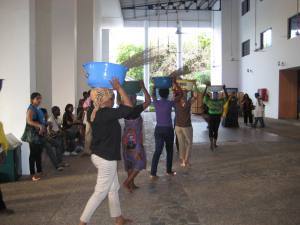 Up again. Listening to the Lauryn Hill channel on You Tube, which reminded me of a conversation we had in Accra on Sunday night. After the closing plenary we got into two buses and headed over to a reception held at the Pan-African Writers Association; plastic chairs were set up on the lawn and under the gazebo and so we gathered there to eat, drink, discuss the conference and the next day’s trip to Elmina. Then the dj showed up and ALL the elders started to groove…even Ama Ata Aidoo was dancing! I hope my friends and I will be dancing like that when we’re seventy. It’s strange how invested we are in seeing one another succeed. When a group of us was ready to go, we headed over to the bus but couldn’t find our driver and so we stood there in the dark and somehow started talking about Lauryn. She was recently sentenced to three months in federal prison for tax evasion and we speculated on the reason why—was she too defiant in court? Was it somehow Rohan Marley’s fault? How many kids has she got—five or six? It wasn’t catty gossip; it was a genuine discussion about her well-being, a desire to see her “make it.” Of all the black women artists out there, Lauryn feels like she belongs to us. We worry about her in a way we don’t worry about the others…
Up again. Listening to the Lauryn Hill channel on You Tube, which reminded me of a conversation we had in Accra on Sunday night. After the closing plenary we got into two buses and headed over to a reception held at the Pan-African Writers Association; plastic chairs were set up on the lawn and under the gazebo and so we gathered there to eat, drink, discuss the conference and the next day’s trip to Elmina. Then the dj showed up and ALL the elders started to groove…even Ama Ata Aidoo was dancing! I hope my friends and I will be dancing like that when we’re seventy. It’s strange how invested we are in seeing one another succeed. When a group of us was ready to go, we headed over to the bus but couldn’t find our driver and so we stood there in the dark and somehow started talking about Lauryn. She was recently sentenced to three months in federal prison for tax evasion and we speculated on the reason why—was she too defiant in court? Was it somehow Rohan Marley’s fault? How many kids has she got—five or six? It wasn’t catty gossip; it was a genuine discussion about her well-being, a desire to see her “make it.” Of all the black women artists out there, Lauryn feels like she belongs to us. We worry about her in a way we don’t worry about the others…
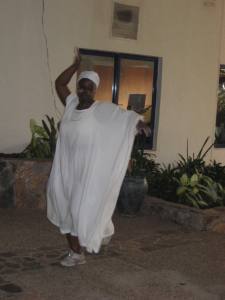 I skipped a couple of panels on Saturday in order to have time to work on my talk, but in the end I ran out of time and never even got to The Hummingbird’s Tongue. I did talk about mental illness and family legacy, though, and since I was the first presenter I didn’t have to worry about the two blackouts that came toward the end of our panel (kudos to Cheryl Sterling who kept right on talking in the dark!). On Saturday the day ended with three amazing performances by Wura Ogunji, Rosamond S. King, and Gabrielle Civil. As Rosamond led us from the conference venue to the sea, I talked with Gina Athena Ulysse about activism and the future of OWWA. Later that night I tried to write about my ambivalence around activism—how can you change the world when you’re hoarding time to write? I wrote, “I don’t want to be a martyr.” My friends give far more than I do to the various causes concerned with the welfare of black women, and I have witnessed their triumphs along with the toll such projects can take on their own health and well-being. Gina assured me that there are lots of different ways to contribute to “the cause,” and each woman has to find the way that’s right for her. Writing a check doesn’t feel like activism but sometimes that kind of contribution keeps the wheels turning. This weekend I have to grade final exams and finish the revisions for this latest article. I’m not “in the trenches”—I stir the pot in my own way, but mostly I protect myself and my writing time. Is Toni Morrison an activist? The women I most admire died young—June Jordan, Audre Lorde—and I don’t want to share their fate. But can you achieve that level of greatness without taking risks? I’m risk-averse but maybe that’s something I need to work on. I’ve got the example of my daring friends before me so I guess it’s time to step out of the shadows…
I skipped a couple of panels on Saturday in order to have time to work on my talk, but in the end I ran out of time and never even got to The Hummingbird’s Tongue. I did talk about mental illness and family legacy, though, and since I was the first presenter I didn’t have to worry about the two blackouts that came toward the end of our panel (kudos to Cheryl Sterling who kept right on talking in the dark!). On Saturday the day ended with three amazing performances by Wura Ogunji, Rosamond S. King, and Gabrielle Civil. As Rosamond led us from the conference venue to the sea, I talked with Gina Athena Ulysse about activism and the future of OWWA. Later that night I tried to write about my ambivalence around activism—how can you change the world when you’re hoarding time to write? I wrote, “I don’t want to be a martyr.” My friends give far more than I do to the various causes concerned with the welfare of black women, and I have witnessed their triumphs along with the toll such projects can take on their own health and well-being. Gina assured me that there are lots of different ways to contribute to “the cause,” and each woman has to find the way that’s right for her. Writing a check doesn’t feel like activism but sometimes that kind of contribution keeps the wheels turning. This weekend I have to grade final exams and finish the revisions for this latest article. I’m not “in the trenches”—I stir the pot in my own way, but mostly I protect myself and my writing time. Is Toni Morrison an activist? The women I most admire died young—June Jordan, Audre Lorde—and I don’t want to share their fate. But can you achieve that level of greatness without taking risks? I’m risk-averse but maybe that’s something I need to work on. I’ve got the example of my daring friends before me so I guess it’s time to step out of the shadows…


May 23, 2013
lag
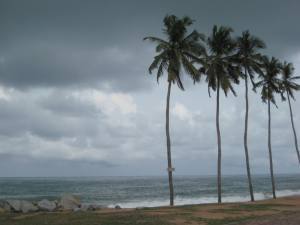 I woke at 3:30 this morning—7:30 in Ghana, which was the time I woke each morning for the conference. We touched down at JFK just before dawn yesterday; ten hours to cross the Atlantic Ocean, half a day to fly over 5000 miles. So much about this trip has to do with contrast—between here and there, then and now. I didn’t think of our visit to Elmina Castle as a homecoming; I didn’t stand in the narrow Door of No Return and think I had somehow performed a gesture of reconciliation. I said a brief, silent prayer and tried to keep moving—there were so many rooms, so many levels to explore, so many facts to absorb. The governor’s chambers were at the very top of the castle—and it is a castle, even though that seems like a misnomer to me. There’s a moat and a drawbridge, there are cannon pointed out at sea and inland at “the natives.” And rightly so, since the local Africans helped the Dutch to overthrow the Portuguese, not that that was much of an improvement. The British took over after 250 years but regardless of the colonial ruler, enslaved Africans continued to be marched from the interior to the coast and at any given time at least a thousand people (400 women, 600 men) were held in dark, filthy, airless cells on the ground floor of the castle. When soldiers drank too much or abused their “privileges” with the enslaved women, they were locked in a cell that had three windows and plenty of light. But when a slave rebelled, he was locked in the condemned room and left to die—no window, no air, no light. From atop the walls of the castle you could walk in the sun, enjoy the refreshing breeze, look out over the sea and almost forget about the dungeons below—forget about the interior courtyard and the governor’s balcony where he stood to survey the enslaved women in order to select his next rape victim. She was then bathed by soldiers with water from a cistern beneath the courtyard before being led up a private staircase the conveniently ended at a trap door right in front of the governor’s chambers. It was hard to stay angry—you felt disgust and rage but then your sorrow outweighed everything else. I was ready to leave Elmina before the tour
I woke at 3:30 this morning—7:30 in Ghana, which was the time I woke each morning for the conference. We touched down at JFK just before dawn yesterday; ten hours to cross the Atlantic Ocean, half a day to fly over 5000 miles. So much about this trip has to do with contrast—between here and there, then and now. I didn’t think of our visit to Elmina Castle as a homecoming; I didn’t stand in the narrow Door of No Return and think I had somehow performed a gesture of reconciliation. I said a brief, silent prayer and tried to keep moving—there were so many rooms, so many levels to explore, so many facts to absorb. The governor’s chambers were at the very top of the castle—and it is a castle, even though that seems like a misnomer to me. There’s a moat and a drawbridge, there are cannon pointed out at sea and inland at “the natives.” And rightly so, since the local Africans helped the Dutch to overthrow the Portuguese, not that that was much of an improvement. The British took over after 250 years but regardless of the colonial ruler, enslaved Africans continued to be marched from the interior to the coast and at any given time at least a thousand people (400 women, 600 men) were held in dark, filthy, airless cells on the ground floor of the castle. When soldiers drank too much or abused their “privileges” with the enslaved women, they were locked in a cell that had three windows and plenty of light. But when a slave rebelled, he was locked in the condemned room and left to die—no window, no air, no light. From atop the walls of the castle you could walk in the sun, enjoy the refreshing breeze, look out over the sea and almost forget about the dungeons below—forget about the interior courtyard and the governor’s balcony where he stood to survey the enslaved women in order to select his next rape victim. She was then bathed by soldiers with water from a cistern beneath the courtyard before being led up a private staircase the conveniently ended at a trap door right in front of the governor’s chambers. It was hard to stay angry—you felt disgust and rage but then your sorrow outweighed everything else. I was ready to leave Elmina before the tour 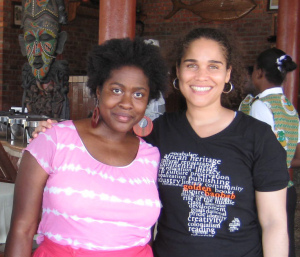 even ended. Our guide Ato was excellent; I asked him how he managed his emotions and he said he used to come to work early and stand in the dungeons to cry. What did we do? We piled back onto our little bus—after buying books or crafts or fabric from the shops located throughout the castle—and went to a stunning beach resort to have lunch. As soon as we stepped off the bus at Elmina we were surrounded by young men trying to learn our names so they could make personalized bracelets or sea shells for us to purchase after the tour. Elmina’s main industry is fishing but it remains a place of commerce and trade. Tourists pay admission to enter the castle (double if you want to take photos); Ato felt tourism had dropped off since 9/11 but noted that the flight is also expensive. It’s a strange irony that the descendants of those whose ancestors were once enslaved here in West Africa now have the means (some of us) to return and “pay tribute”…
even ended. Our guide Ato was excellent; I asked him how he managed his emotions and he said he used to come to work early and stand in the dungeons to cry. What did we do? We piled back onto our little bus—after buying books or crafts or fabric from the shops located throughout the castle—and went to a stunning beach resort to have lunch. As soon as we stepped off the bus at Elmina we were surrounded by young men trying to learn our names so they could make personalized bracelets or sea shells for us to purchase after the tour. Elmina’s main industry is fishing but it remains a place of commerce and trade. Tourists pay admission to enter the castle (double if you want to take photos); Ato felt tourism had dropped off since 9/11 but noted that the flight is also expensive. It’s a strange irony that the descendants of those whose ancestors were once enslaved here in West Africa now have the means (some of us) to return and “pay tribute”…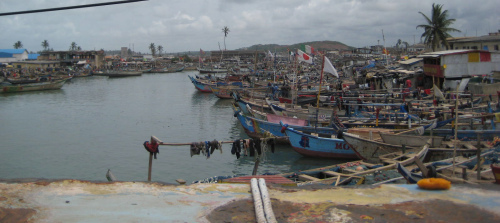
Here comes the rain. I have a library presentation this morning and final exams this afternoon so I’m glad I had yesterday to rest and reflect on my trip. The Yari Yari Ntoaso conference was great—so much talent and wisdom and possibility packed into four days! I know I won’t be able to recall everything that happened since I last blogged on Friday. One of the things about being abroad is that you have to surrender AND adapt to a different way of life. Now that I’m back in Brooklyn I’ve got uninterrupted internet service and no blackouts to contend with, so when I feel like blogging I just sit down and start typing. But in Accra I often couldn’t get online at the hotel, and instead of writing in a journal I just didn’t write at all. It may take me a while to catch up but this is a start…







